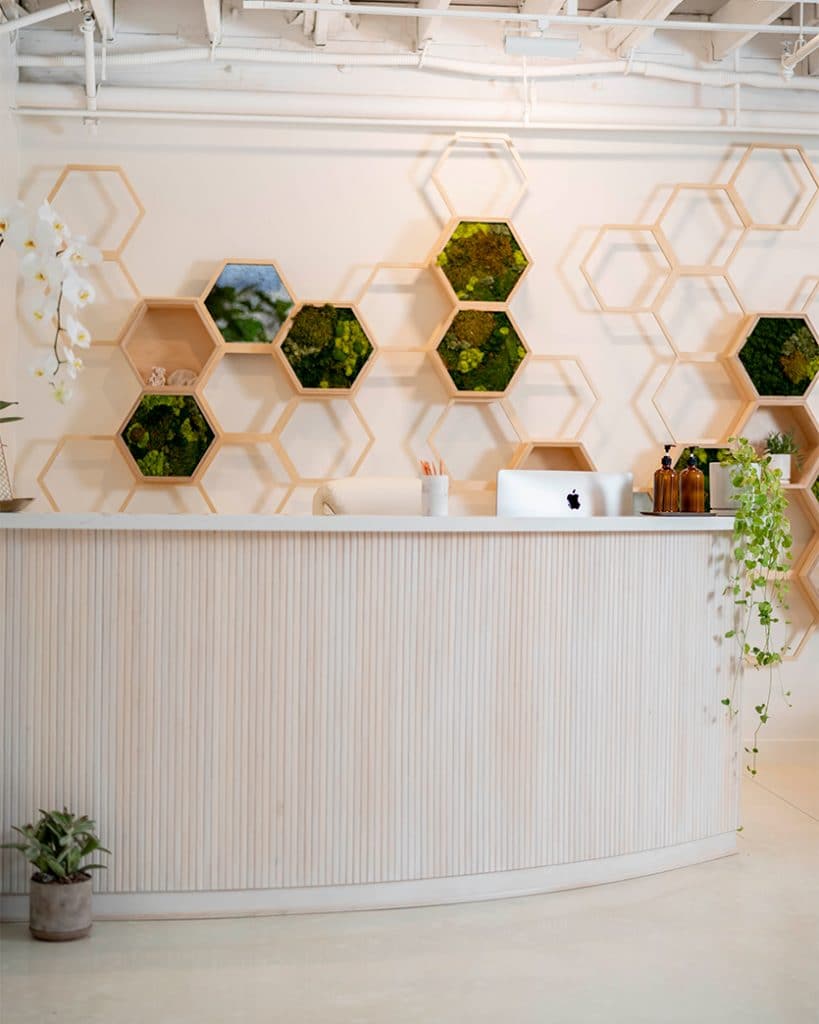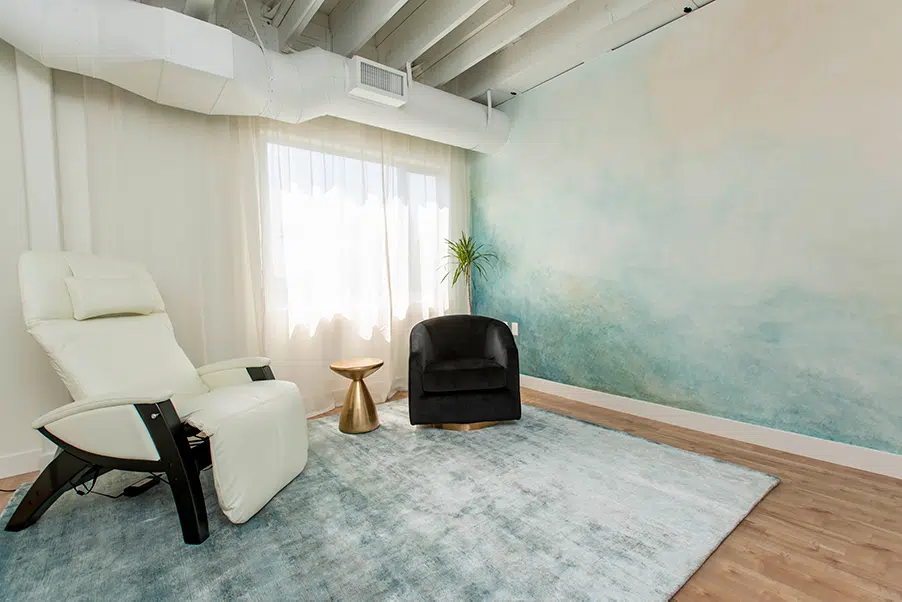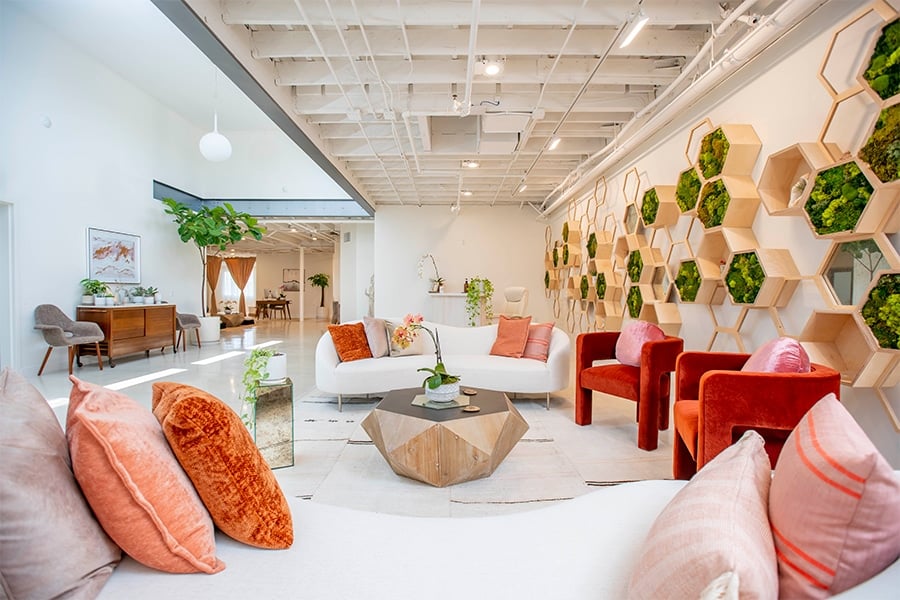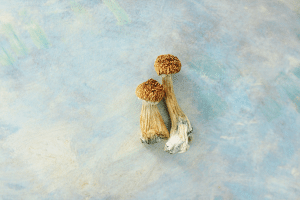Nowhere are the possibilities of psychedelic therapy more evident—or decadent—than a luxury ketamine clinic called Field Trip in Los Angeles. Picture this: You walk into a nondescript building on a sunny afternoon. Elevator doors open to a skylit lobby filled with Buddha statues, rock salt lamps, and the soothing sounds of jazz piano. You take off your shoes and slip on a pair of hotel slippers. This could be a high-end resort or yoga studio—until you’re led to a darkened room where a ketamine drip awaits. As you settle into a vibrating massage chair, a needle in your arm infuses the ketamine into your bloodstream, and you float into the clouds of your subconscious with a deep sense of calm. When you come back to reality, your therapist is holding your hand, ready to talk. She also offers you a snack: some quinoa chips, perhaps?
Field Trip is a mind-bending look into the frontier of psychedelic therapy, currently a luxury commodity for a privileged few. The bigger question is whether ketamine clinics could serve as a template for a wider variety of psychedelics if and when they are legalized in the near future. Ketamine, a Schedule III drug, is currently the only psychedelic legal for clinical use; while it is primarily used as an anesthetic, licensed practitioners can prescribe it off-label for mental health conditions.
The menu of psychedelics available for therapy could be expanding soon, though: The FDA is projected to approve MDMA for PTSD in 2023 and psilocybin for depression in 2025, according to the Multidisciplinary Association for Psychedelic Studies (MAPS) and Compass, the organizations sponsoring the studies. (Usona, a nonprofit also investigating psilocybin for depression, declined to give a timeline for FDA approval.) “This is really unprecedented territory,” says Dr. Casey Paleos, science director of ketamine therapy service Mindbloom. “The FDA has never approved drug-assisted therapy—only drugs, so this might entail some novel regulations.”
Read: Best Ketamine Clinics and Therapists
Many unknowns surround how psychedelic therapy with legal MDMA and psilocybin will be regulated. Until the FDA releases its official protocol, also known as REMS (Risk Evaluation and Mitigation Strategy), the future paradigm remains hazy. So, for now, what do we know about how and where treatments will be offered—and do ketamine clinics have a leg up on other practitioners, such as private doctors or retreat centers? In other words, are ketamine clinics setting the model for the future of psychedelic therapy, or are they simply operating on wishful guesswork, with a dose of opportunism?

Ketamine clinics are currently proliferating across America: Marketing agency Ketamine Media estimates there are more than 600 in their database. While there’s limited data on the size of the ketamine clinic market specifically, the estimated market size for all psychedelic-derived medicines and therapies currently being investigated is $100 billion, according to Canaccord Genuity, an investment banking and financial services firm.
Most ketamine clinics only offer infusions—impersonal procedures where anesthesiologists pump the drug into your veins and then show you the door. On the other hand, clinics like Field Trip pair infusions with psychotherapy where therapists help patients integrate their trips. This distinction is important, as professional therapy will almost certainly be required for MDMA and psilocybin, says Rick Doblin, founder of MAPS. “Ideally we want people to be cross-trained for psychedelic psychotherapy working with ketamine, MDMA, and psilocybin.”
Ketamine clinics offering both psychotherapy and infusions are thus making a calculated move as they aim to expand into other psychedelics. Since there is no established protocol on how to offer these services, many programs blend best practices from the FDA’s clinical studies and underground psychedelic therapists. “Two years ago, we realized that access to psilocybin and MDMA would happen faster than people anticipated, so we started thinking about what we could do to build a brand,” says Field Trip’s executive chairman Ronan Levy. “We connected the dots and decided we can start providing psychedelic-assisted therapies with ketamine now, so the infrastructure will already exist.”
How to Grow Shrooms Bundle
Take Both of Our Courses and Save $90!
Read: Ketamine for Depression: The Highs and Lows
Whether people will be able to afford it is another issue. Field Trip’s recommended six-week package costs around $6000. Awakn, the UK’s first ketamine clinic, offers a ten-week package for £6,000 (~$8000). (Ketamine infusions can range from $400 to $2000 per treatment and most clinics will recommend an initial course of six treatments.) For now, government programs and most health insurance will not cover ketamine therapy, so patients must pay out of pocket. “We’re keen for these treatments to be free,” says Awakn founder Ben Sessa. “But I don’t want to wait around for the [government] to pull its finger out and fund the treatments. We want to have the clinics on high street for patients who can pay.”

MDMA and psilocybin might be even more costly as trips can go for six hours, compared to ketamine’s 90 minutes, and two therapists will likely need to be present the whole time. (Although, while it’s not yet guaranteed that FDA-approved MDMA and psilocybin therapy will be covered by insurance, having insurance coverage is the intention behind those developing these treatments.) “We know there will need to be a prescriber, likely a psychiatrist or nurse, and some kind of trained professional in the room,” says Dr. Casey Paleos, science director of the ketamine telemedicine app Mindbloom. “What’s in question is the required number of clinicians and their credentialing.”
Mindbloom, a Headspace-like online platform that costs around $1100 for six ketamine treatment sessions over three months, offers another potential model with a cheaper price tag. Instead of a physical clinic, the company partners with psychiatrists who prescribe ketamine, then its compounding pharmacies ship clients sublingual ketamine tablets through the mail. Additionally, they receive a “Bloombox” treatment kit complete with an eye mask, notebook, and container to hold their medicine. Clients are also paired with trained guides for virtual integration sessions and offered unlimited texting. Like the other ketamine clinics, Mindbloom is planning to expand into psilocybin and MDMA as soon as the FDA gives the green light. While it is not yet known if virtual apps will be permitted for MDMA and psilocybin, Doblin says that ketamine providers have one key advantage: their existing networks of doctors, as prescriptions will be required to access these medicines.
Doblin adds that all therapists, regardless of their credentials, will need to be trained by the programs provided by MAPS for MDMA, or Compass and Usona (for psilocybin), as these organizations are currently leading the FDA’s clinical trials. “Commercial sponsors have invested millions to get these [drugs] approved, so we have a responsibility to make sure therapists are properly trained so the drug isn’t removed from the market,” Doblin says.
Indeed, ketamine clinics may have a leg-up over private practices through existing branding and infrastructure—but their staff will need to go through the same credentialing process as everyone else. Yet even so, what we’re seeing is a glimpse of the future, in the here and now: ketamine clinics offer not just an example, but a window into what we may be able to expect in the new world of legal psychedelic therapy in years to come.

DoubleBlind is a trusted resource for news, evidence-based education, and reporting on psychedelics. We work with leading medical professionals, scientific researchers, journalists, mycologists, indigenous stewards, and cultural pioneers. Read about our editorial policy and fact-checking process here.

DoubleBlind Magazine does not encourage or condone any illegal activities, including but not limited to the use of illegal substances. We do not provide mental health, clinical, or medical services. We are not a substitute for medical, psychological, or psychiatric diagnosis, treatment, or advice. If you are in a crisis or if you or any other person may be in danger or experiencing a mental health emergency, immediately call 911 or your local emergency resources. If you are considering suicide, please call 988 to connect with the National Suicide Prevention Lifeline.






